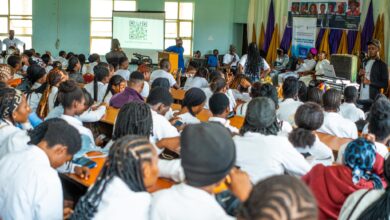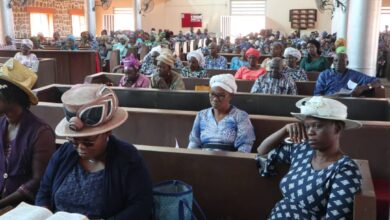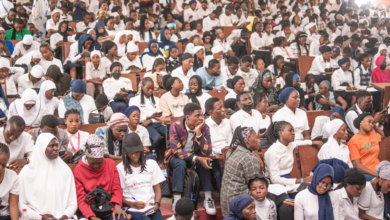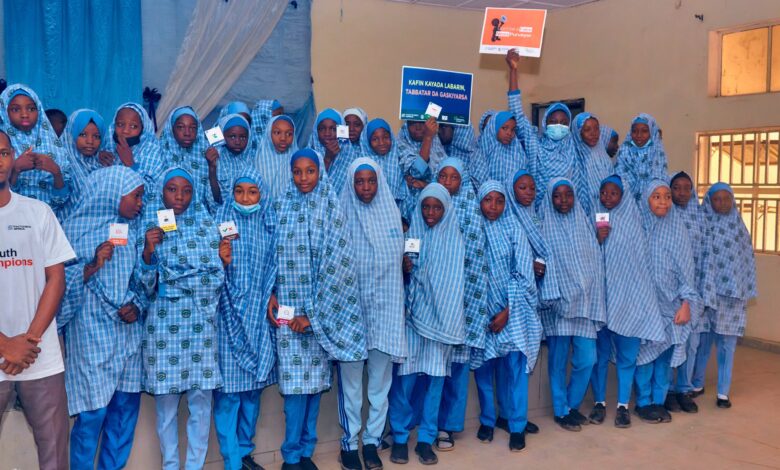
By Oluwaseye Ogunsanya
Furthering its mission to reach more secondary schools in Nigeria, FactCheckAfrica has expanded its recently launched Gamification Fact-Checking Flashcards Project, an initiative designed to equip secondary school students with critical media literacy and fact-checking skills.
The first phase of the project had already been introduced in several schools across multiple states. Now, the second phase has reached secondary schools in Abuja, Sokoto, Jigawa, Lagos, and Oyo, engaging thousands of students with practical gamified fact-checking technique.
Over 1000 Secondary School Students Reached In Abuja Schools
At Jektec International Academy in Ozoro, Abuja, 400 senior secondary school students were engaged in the sensitization session organised in collaboration with Olofuson Media. Facilitator David Moses Olofu led discussions on the prevalence of misinformation, its spread across platforms, and verification techniques using tools like MyAIFactchecker.
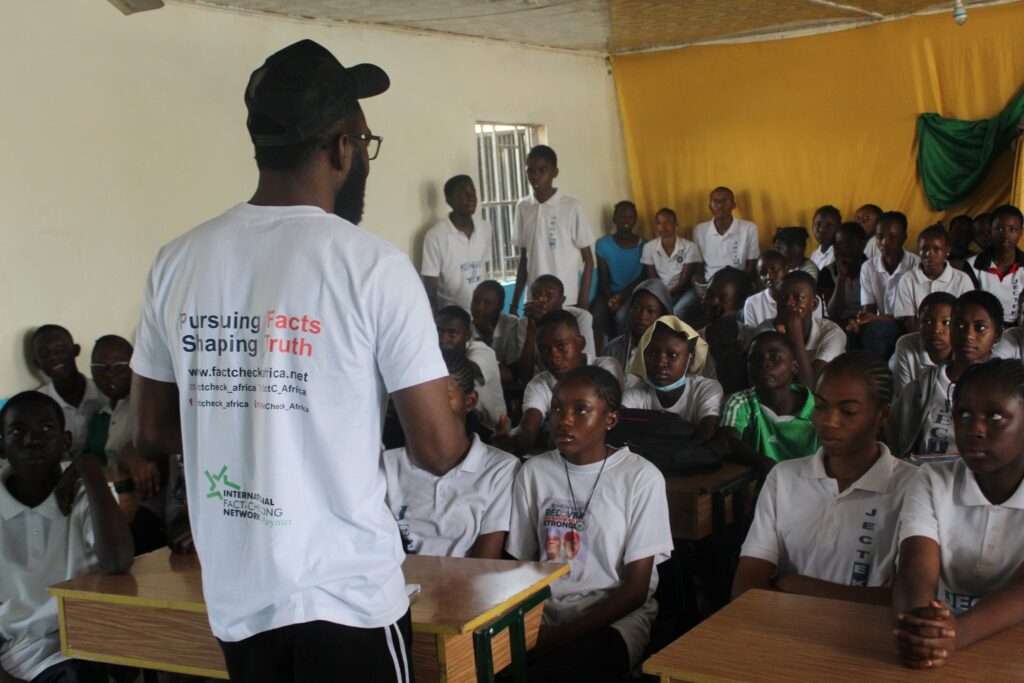
Olofu noted that students initially struggled to see how misinformation directly impacted them, but real-life examples helped them understand its dangers. As the session progressed, students actively engaged in fact-checking exercises, shared experiences, and voiced concerns about misinformation challenges—including limited internet access for verification. Some students even began practicing fact-checking in real time using their smartphones.
“Through interactive discussions and practical demonstrations, students shared their experiences with misinformation and engaged in hands-on fact-checking exercises. Participants raised concerns about limited internet access for fact-checking and the challenge of correcting misinformation once shared.
“Some students began using their smartphones during the session to practice fact-checking with the tools demonstrated. They committed to applying these new skills by ensuring they verify news and information before sharing it.
“A common example of misinformation discussed involved a fabricated news story about a prominent local figure. Students shared experiences of encountering false information related to political issues in their local communities.” He said.
Similarly, Good Tides Philippian Mission Foundation piloted the project at Total Child Model School in Dutse, FCT, engaging 507 students and teachers. Facilitators Lois Tofunmi Amele and Patricia Jessie conducted two tailored sessions—one for senior students and one for junior students, incorporating flashcards, interactive discussions, and hands-on demonstrations with MyAIFactchecker and Duplichecker.
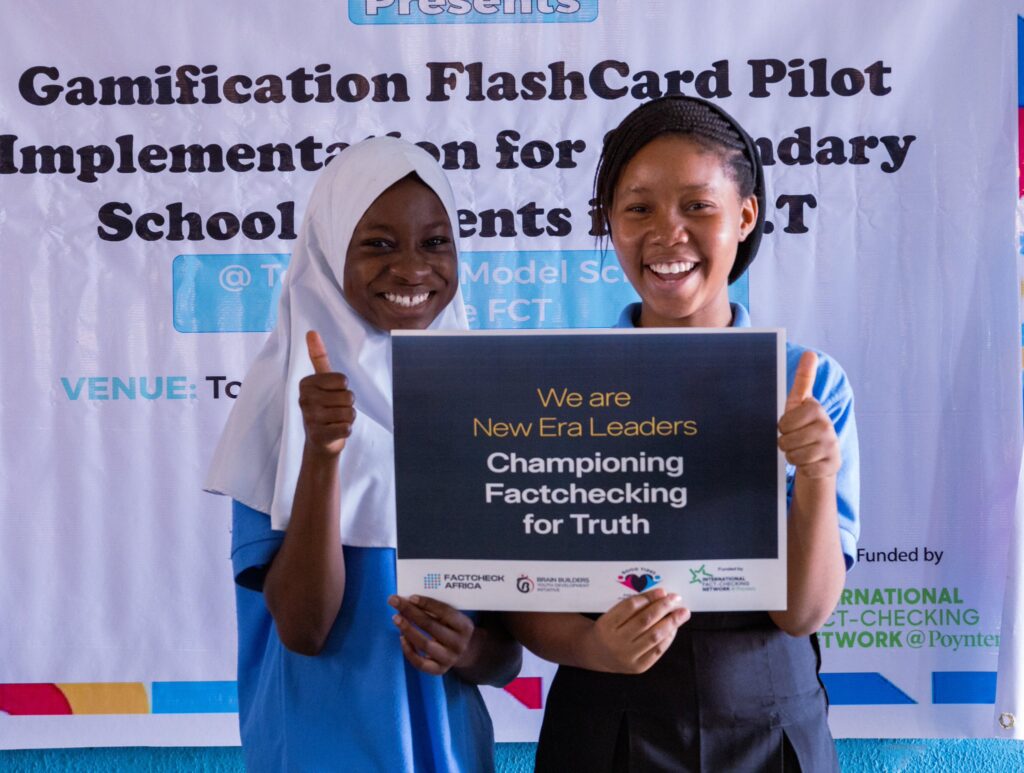
Students raised questions about how to distinguish credible sources online, reflecting a growing need for media literacy education. Many participants expressed interest in sharing fact-checking techniques with family and peers.
“The sessions utilized flashcards featuring examples of misinformation and fact-checking tips to facilitate learning discussions. These were supplemented by presentations and demonstrations of fact-checking tools (MyAIFactchecker, Duplichecker)
“The students readily shared their experiences and perspectives during the discussions. Several participants expressed concern about the difficulty of distinguishing between credible and unreliable sources online. For example, one participant asked “How can I tell if a website is trustworthy? These questions and concerns highlight a clear need for increased media literacy education within the community” They narrated.
They also added that feedback from the participants was overwhelmingly positive, with many expressing their intention to share the fact-checking techniques learned with family and friends.
Additionally, Mithrive Initiative for Development facilitated sessions at Oloye Private School and Government Secondary School Gwarimpa in Abuja, engaging 500 students aged 15 to 20. The facilitators highlighted misinformation trends, verification strategies, and tools like date-checking, source validation, and cross-referencing multiple sources.
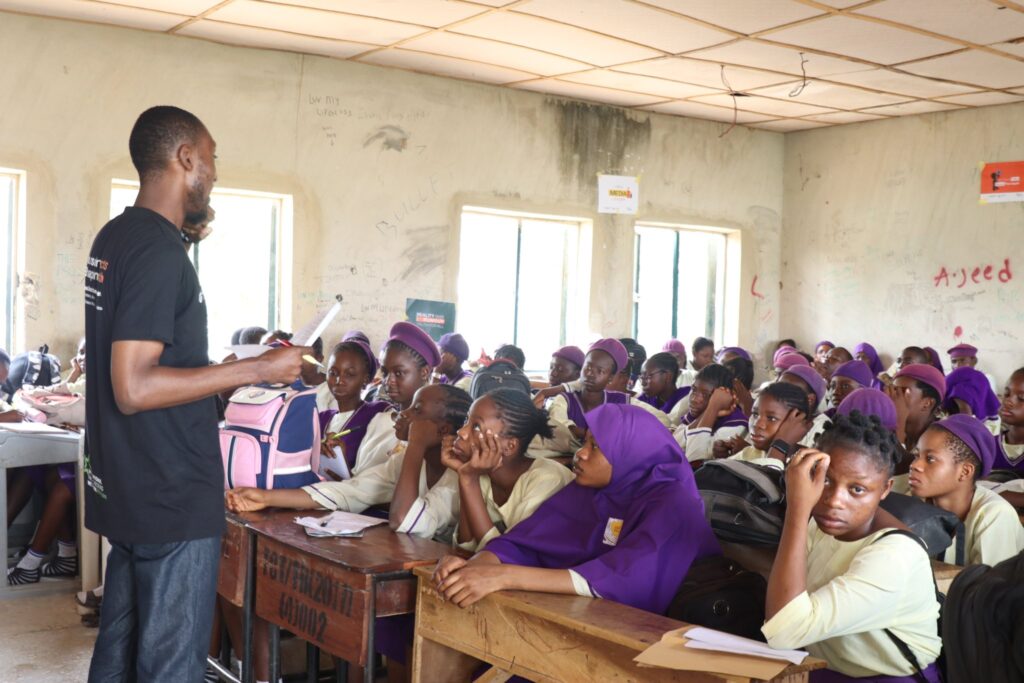
A recurring concern was the role of social media in misinformation, with students recognizing that false news is often spread for personal or political gain. Participants emphasized the need for more training opportunities to strengthen community awareness on fact-checking.
“During the sensitization, the students were given a background knowledge on misinformation, stating familiar instances of fake news they know about. The students were also informed about the various means through which fake information is spread and strategies to verify the validity of any information before they are accepted as facts.
“More also, on the strategies to verify the validity of information, we highlighted a number of tools which can be used for verifying information such as checking the dates of the news, the sources, confirming from multiple sources, etc. We went further to encourage the participants to ensure that irrespective of their interest in a topic or anxiety to share the news, it is important it be verified.” The facilitators narrated.
The session ended with calls for more training opportunities to strengthen community knowledge on fact-checking.
Ikorodu Schools Embraces Gamified Fact-Checking Flashcards Project
In Ikorodu, Lagos State, the Ikorodu Division Youth Initiative (IDYI) implemented the project, reaching over 2,000 students at Shams-el-deen Junior Grammar School and Ayangburen Junior High School.
Facilitators Oluwakeji Onabajo and Waliu Adeyeri introduced students to fact-checking strategies, misinformation detection techniques, and digital verification tools. Recognizing limited internet access among students, the facilitators encouraged them to seek guidance from teachers or school authorities when verifying information.
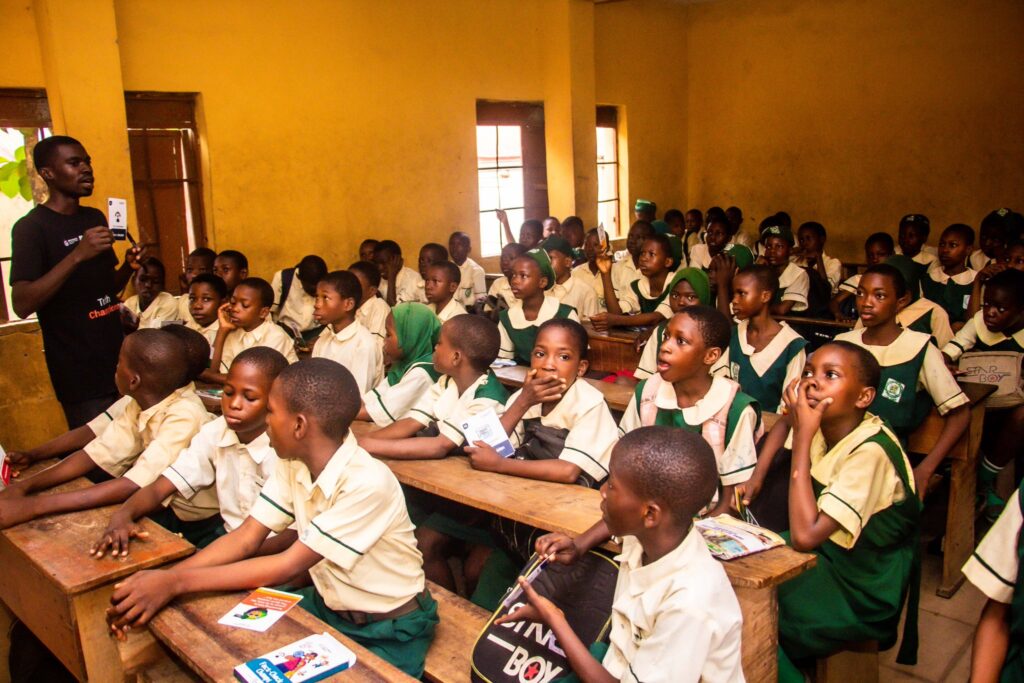
“During the sensitization at the schools, the students were given a background knowledge on misinformation, explaining the concept of fact checking and fake news. The students were also informed about the various means through which fake information is spread and strategies to verify the validity of any information before they are accepted as facts. More also, on the strategies to verify the validity of information, we highlighted a number of tools which can be used for verifying information such as MyAIFactchecker website.
“We proceeded by encouraging the students to ensure that irrespective of their limited access to the internet, they should endeavour to always reach out to their teachers or students who hold positions of authority in the school to verify the validity of every information before they believed any information. We also encouraged the students to always cross verify information from different sources to confirm its originality.” They explained.
The sessions concluded with an interactive game, where students were rewarded for correct fact-checking answers. This gamified approach sparked high engagement, leading to requests from school authorities for ongoing training and educational materials. Students also made a pledge to become fact-checking champions, committing to curbing misinformation and educating peers about the importance of verification.
FUBCi Hosts Gamification Fact-Checking Flashcards Project in Far Away Jigawa, Attracting 400 Students
Similarly, in far away Jigawa State, the Future Development for Better Community Initiative (FUBCi) piloted the project at Government Day Science and Technical School in Gadadin, Dutse, reaching 400 students aged 12 to 17.
Facilitators Adamu Sulaiman, Nafisa Bello, and Bashir Abdulhayaat used an interactive learning model, including group discussions and hands-on exercises. Students were divided into teams, where they analyzed real-world examples of misinformation and applied fact-checking strategies.
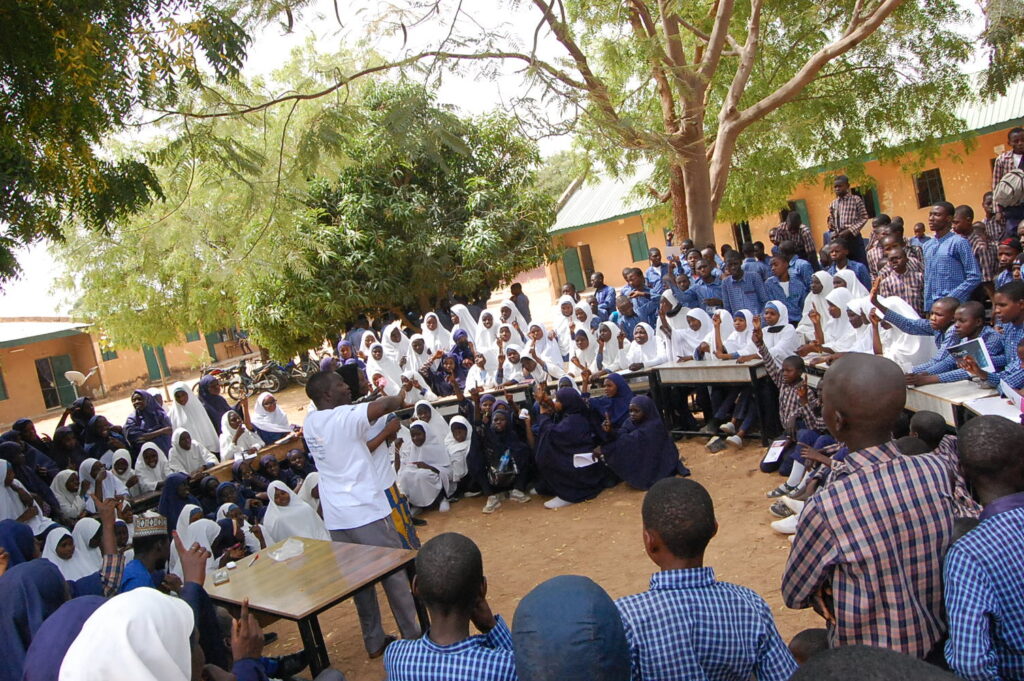
“We used an open lecture to the SS 1, 2, 3 participants about the fact checking process for identification of valid information, avoiding misinformation and fake news. In this method participants were divided into groups and discussed some examples of fake news currently circulating, they were able to identify the facts about the news using strategies taught to them.
“Moreover, placards and stickers containing fact checking information were distributed to the participants and they were charged to disseminate the awareness beyond the school to their respective societies. The participants developed much curiosity about the entire program and they asked a lot of questions about fact checking strategies.” They reported.
A notable takeaway was students’ concern over misinformation spread by political figures. Many expressed keen interest in establishing a fact-checking hub within their school. The school director and staff recommended that the project expand to other secondary schools and tertiary institutions, incorporating local media collaborations and social media outreach to enhance awareness efforts.
NACJ Takes Gamification Fact-Checking Flashcards Project to Sokoto Secondary Schools, Trains Teachers on How to Use Fact-Checking Tools
In Sokoto State, the National Association of Campus Journalists (NACJ) conducted the project at Usmanu Danfodiyo University Model Secondary School and Unity Comprehensive Secondary School, engaging 530 students and teachers.
Facilitators Shereefdeen Ahmad and Dauda Musbau employed a flashcard-based game, where students memorized fact-checking content before exchanging cards and recalling key points.
“We covered topics such as the concept of information disorder (fake news), the importance of verification, the dangers of fake news, how to spot fake news and common tools to verify fake news (because we observed that most of them are familiar with using smartphones). As part of the interactive session, we divided the students into four groups and gave each member a flashcard. The students were tasked with playing a game where they had to mention the content of their flashcards. To add a challenge, each student was given two minutes to memorize the content of their card, after which the cards were exchanged. Then, each member had to recall and share the content of the card they received.” They explained.
Beyond students, teachers also received specialized training on fact-checking tools like Google Reverse Image Search and MyAIFactchecker.
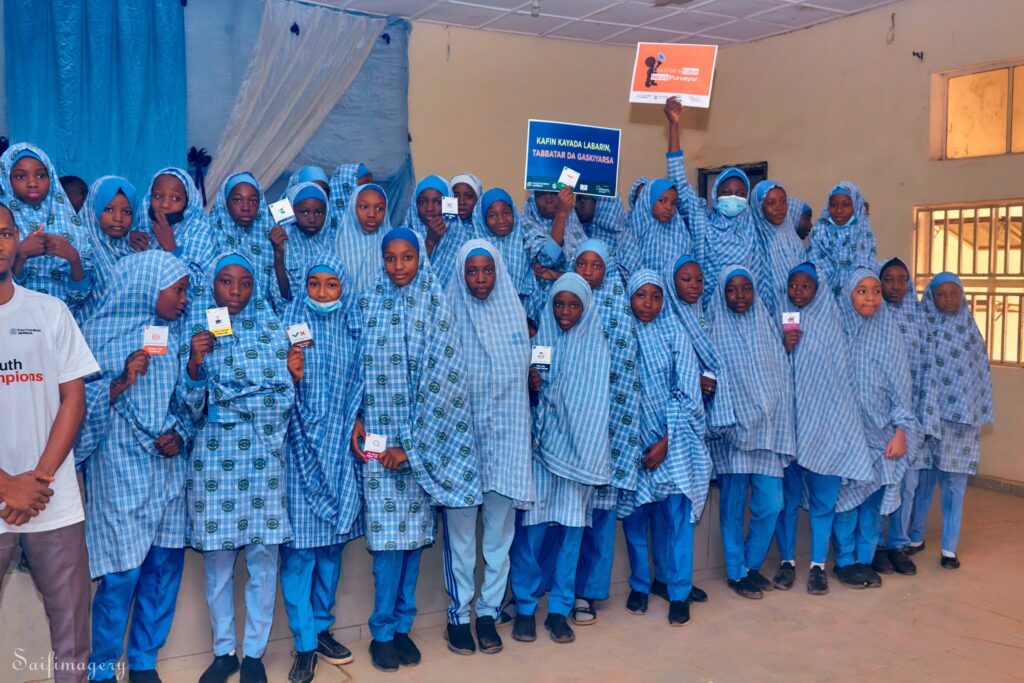
“The school management of Model requested a 30-minute training session for the teachers on how to spot fake news. During this session, we taught the teachers how to use tools like MyAIFactchecker, Google Reverse Image Search, and other resources to verify information.
“During the training, we employed an “illustrative method” to engage the students. This approach involved bringing some students forward to demonstrate, for example, the dangers of spreading fake news. The topics were divided between the two facilitators, with each speaker allotted two 30-minute sessions. Afterward, flashcards and placards were distributed to the students in groups. Also, we used the digital method at Unity Comprehensive Secondary School, where the flashcards are shown to the students on phones.” They said.
Overall, the facilitators observed that the session was both fun and educational for most students. They also added that despite their age, many students were familiar with social media and they were able to easily relate to the examples cited, particularly those involving WhatsApp. Relatively, they were also excited about the flashcards, as many of them played with the cards, viewing them as part of a game.
CEHUWEI Engages Over 500 Students in Anglican Grammar School Ogbomoso, Oyo
In Oyo State, the CEDARS for Human Welfare Initiative (CEHUWEI) conducted the project at Anglican Grammar School in Ogbomoso reaching 560 students aged 11 to 18. Facilitators Oluwabukola Olatunji and Tobiloba Oyeyinka utilized gaming techniques with flashcards to enhance student engagement.
The two-hour session saw active participation, with students requesting educational banners as constant reminders of fact-checking principles. School authorities expressed appreciation for the initiative and encouraged continued engagement with students.
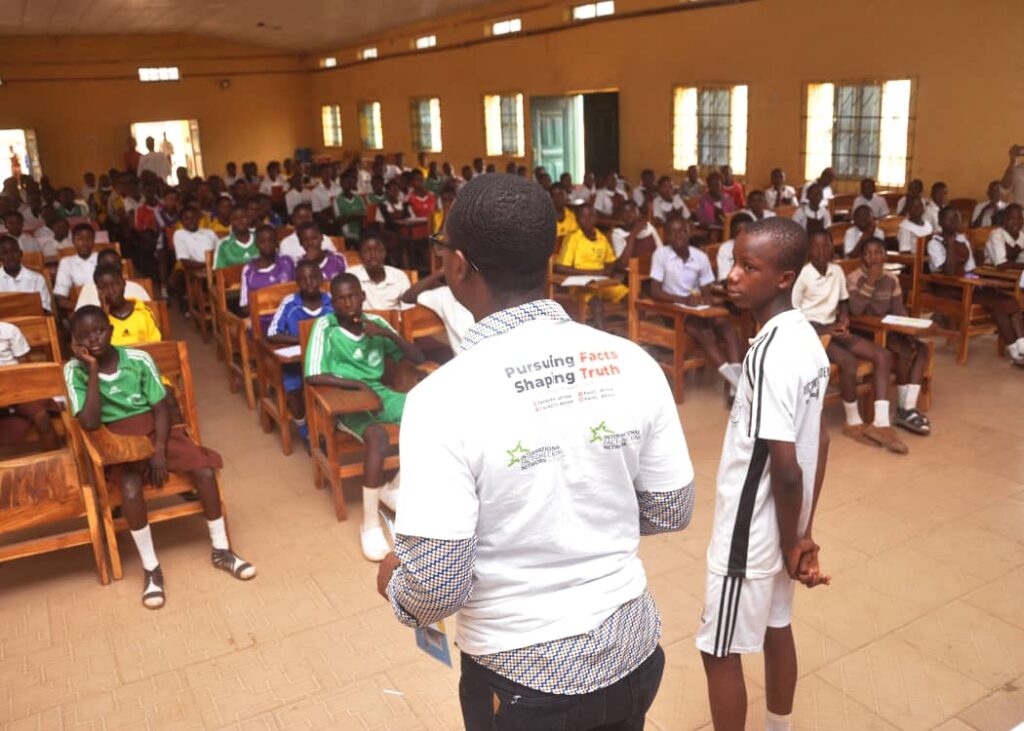
“Participants were keen with involvement, ability to give perfect answers to the gaming flashcard with adequate explanations to each of the questions. There were a series of questions in which we proffer suitable answers to each, it was a great experience with the students who are anxious to win prizes from the organizer. The bonus of gifts to answers given rightly raised the participation of the students.
“The participants requested for the placement of the event banner in a strategic place within the school compound for possible reminder and follow up, this was granted by us as we plan to make the banner and other gaming flash cards available. The students also promised to relate the lessons learnt from the gamification flashcard program to other students in their classes as participants were selected from the entire population of the students.” They narrated.
Parting words
Evidently, The Gamification Fact-Checking Flashcards Project has quickly gained traction as a vital media literacy initiative in Nigeria. The success of these sessions highlights an increasing awareness among young Nigerians of the dangers of misinformation and their eagerness to develop fact-checking skills.
Organizers and facilitators across various states have emphasized the need for continued engagement, more educational materials, and long-term programs to cement the impact of the project.
With further expansions planned, FactCheckAfrica and its partners remain committed to equipping Nigerian youngsters with the knowledge and skills necessary to navigate the digital information space responsibly and combat the spread of misinformation within their communities.
